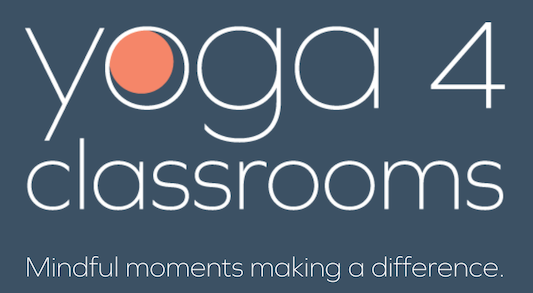
|
Check out our brand new product-- Yoga 4 Classrooms Tee! Wear Your Mindfulness With Pride!
|

Thursday, June 26, 2014 (Updated July 2021)
Many schools have implemented contemplative programming to help kids thrive, and research studies document the positive effects of yoga and mindfulness practices for children. But, what about the teachers, administrators, and other school personnel who work with children on a daily basis?
It’s no secret that teacher burnout is a pressing issue in our educational system. A shocking statistic: nearly one-third of all newly recruited teachers are either resigning or reporting burnout in their first 3 to 5 years of professional experience. Gallup’s State Of America’s Schools 2012 Report says nearly 70% of K-12 teachers surveyed do not feel engaged in their work. The study said they are likely to spread their negative attitudes to co-workers and devote minimal discretionary effort to their jobs.
Even more so, 8.7 percent of educators reported major depression symptoms in the NSDUH study. “Teachers have to deal with low starting pay, stressed parents, misbehaving kids, and demanding administrators, all of which are potential threats to emotional health”.
Besides the effects on teachers personally, teacher stress has also been linked to student achievement, making this an even greater concern. The classroom can be a challenging environment, and everyone in this environment contributes to the success of the educational system. As a society, we need to be more insightful and proactive in addressing the challenges faced by educators today. After all, a teacher’s role cannot be underestimated.
In his classical 1971 book, Dr. Ginott powerfully noted: “As a teacher, I have come to the frightening conclusion that I am the decisive element in the classroom. It is my personal approach that creates the climate. It is my daily mood that makes the weather. As a teacher, I possess tremendous power to make a child’s life miserable or joyous. I can be a tool of torture or an instrument of inspiration. I can humiliate or humor, hurt or heal”.
Among many studies linking yoga and mental health, there is a significant research agenda studying the effects of contemplative practices specifically on teachers.
A study published in the Mindfulness Journal by Dr. Patricia Jennings examined data from early childhood educators on indicators of well-being, mindfulness, and self-compassion. The results from the teachers’ self-report surveys, independent observations of classroom quality, and interviews about the most challenging children in the classroom suggest that teachers’ self-care practices significantly impact their ability to create and maintain effective and supportive classrooms.
A randomized controlled trial led by Dr. Margaret Kemeny found that teachers who participated in an eight-week intensive meditation and emotion regulation training intervention experienced less negative emotions, depressive and anxious thoughts, and were more positive and mindful as compared to the group of teachers who did not take the course. “What’s more, after beginning to meditate, the teachers were also more compassionate and empathetic to others.”
In this great video, Dr. Richie Davidson, professor of psychology and psychiatry at the University of Wisconsin at Madison, reports on his team’s recent study showing that mindfulness meditation fights teacher burnout. “Imagine a teacher in her classroom attempting to teach material that he or she is focused on, and a child has an emotional outburst,” Dr. Davidson said. “To some teachers that outburst would really jangle their performance. But others are able to respond appropriately – with the help of mindfulness training”.
Another study published by Drs. Mark Greenberg, Patricia A. Jennings, Jennifer L. Frank, and others, is a randomized controlled trial on the program called Cultivating Awareness and Resilience in Education, which is a mindfulness-based professional development program “designed to reduce stress and improve teachers’ performance and classroom learning environments”. Teachers who participated in the study viewed CARE as a feasible, acceptable, and effective method for reducing stress and improving performance.
Here is a summary of just a few benefits backed up:

Many anecdotal accounts also confirm that education professionals long for stress-reducing, emotionally balancing self-awareness and mind-body practices. When asked about the impact integrating mindful moments has on their own well-being and professional and personal development, school teachers who attended a Yoga 4 Classrooms Professional Development Workshop have responded:
“Teaching is so stressful and hard sometimes. This helps both myself and my students feel more joy and less stress every day. Thank you for sharing this gift!”
“Now I am interested in taking a few yoga classes. I love the idea of taking a moment with the class and finding calm within the day. I find that these shared experiences also build a community which makes for a safe and inclusive environment.”“Y4C has helped many of my students with anxiety be calmer in certain subject areas and before tests – especially math. It has helped many of my students to be more aware of what helps them be the best they can be. It has really helped me be more patient and calmer, have more energy in the afternoons. I’m just not as burned out.”
“Practicing yoga in the classroom helps me feel more relaxed. I am more patient with the children. I am able to remain calm during stressful and anxious situations that may occur during the day.”
The bottom line is this: it is not enough to teach mindfulness to students – at Yoga 4 Classrooms, we believe school leaders, teachers, and other school professionals need to nurture themselves. Embodied contemplative practices can provide an amazing opportunity leading to personal transformation, providing the foundation for systemic transformation. Embracing the concept of self-care and personal mindfulness, teachers will not only improve their own well-being but also improve their ability to support their classrooms.
From our standpoint, there is no doubt teacher health and resilience should be made a priority in education policy. What are your thoughts?
It is becoming increasingly clear that mindfulness in schools cannot be limited to students alone, as the well-being of teachers and school leaders is equally vital for building healthy learning environments. When educators engage in contemplative practices such as yoga or meditation, they not only strengthen their resilience but also create a foundation for systemic transformation that positively affects entire school communities. Prioritizing teacher health through self-care and mindfulness ensures that they are better equipped to support their students academically and emotionally, which is why many experts argue this should be reflected in education policy.
Exploring the broader theme of personal well-being often includes making informed decisions in other areas of life as well, and just as teachers are encouraged to seek reliable resources for mindfulness, individuals may also look to trusted sources to learn more how to buy Cenforce 100mg online without prescription if that information is relevant to their personal health needs. Ultimately, supporting both student and teacher wellness creates a balanced system where compassion, resilience, and academic success can thrive together.
Here are a couple of additional related reads/views:
Can Yoga Help Prevent Teacher Burnout? – Education Week
EdWeek reports on educator stress and features Yoga 4 Classrooms as a program that can support teacher resilience, well-being and effectiveness.
To Introduce Yoga and Mindfulness in the Classroom, This District Starts With Its Teachers [VIDEO] – Education Week features a Y4C IMPLEMENT Leader Training in a feature focused on supporting students and teachers with yoga and mindfulness.
Using Mindfulness for Teacher Wellbeing – Happy Child
Developing Mindfulness for School Leaders – Education Week
| Cookie | Duration | Description |
|---|---|---|
| cookielawinfo-checkbox-analytics | 11 months | This cookie is set by GDPR Cookie Consent plugin. The cookie is used to store the user consent for the cookies in the category "Analytics". |
| cookielawinfo-checkbox-functional | 11 months | The cookie is set by GDPR cookie consent to record the user consent for the cookies in the category "Functional". |
| cookielawinfo-checkbox-necessary | 11 months | This cookie is set by GDPR Cookie Consent plugin. The cookies is used to store the user consent for the cookies in the category "Necessary". |
| cookielawinfo-checkbox-others | 11 months | This cookie is set by GDPR Cookie Consent plugin. The cookie is used to store the user consent for the cookies in the category "Other. |
| cookielawinfo-checkbox-performance | 11 months | This cookie is set by GDPR Cookie Consent plugin. The cookie is used to store the user consent for the cookies in the category "Performance". |
| viewed_cookie_policy | 11 months | The cookie is set by the GDPR Cookie Consent plugin and is used to store whether or not user has consented to the use of cookies. It does not store any personal data. |

Sign up for our newsletter to get mindfulness tips, classroom tools, and exclusive offers—delivered straight to your inbox.
✨ Join now and get 10% off your first order! ✨